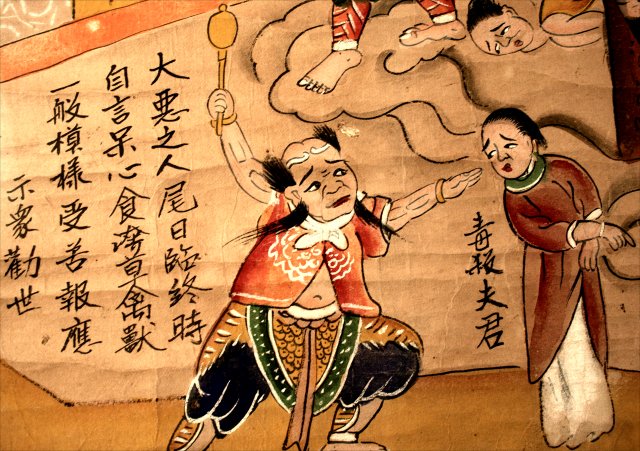
Translations
Brown-robed woman on bridge (left): Poisoned her husband.
Man forced off bridge (right): Unfilial to his father and mother.
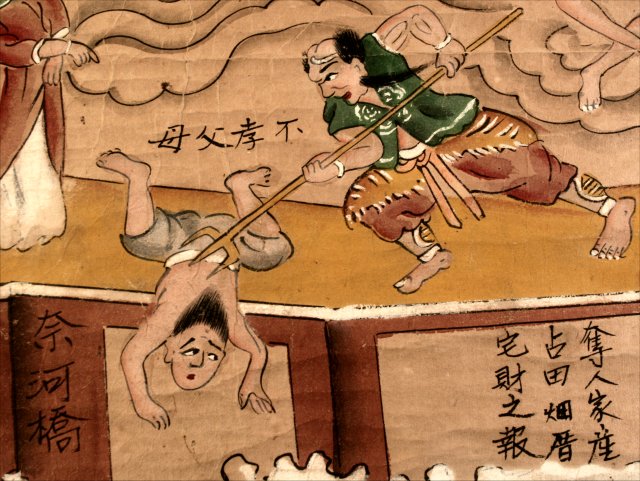
Translations
Text just below bridge: Recompense for stealing another's property, seizing fields and graves, dwellings and goods.
Text on bridge support: Bridge of No Alternative
Appearance in a Taiwanese visit to hell
For a description of the Bridge of No Alternative from a Taiwanese spiritual medium who had engaged in a series of hell tours between 1976 and 1979, see Voyages to hell, Chapter 13.The Buddhist poet Hanshan from the seventh or eight century wrote of people blocked by a major river in hell, and Robert G. Henricks translates his warning verses as follows:
Not to practice the 'true and orthodox way,'
But follow perversions -- we call them 'devout old hags.'
Their mouths rarely confess their shame to the gods and the Buddhas,
While their hearts are full of jealousy and hate.
Behind your back they're eating fish and meat,
While in front of others they chant Buddha's name.
If this is the way you cultivate yourself,
It will be difficult indeed to escape from the river of hell.
The "Bridge of no alternative" (also rendered as the "Bridge of no return," "of no recourse" or "of futility") stretches across the bottom of scroll A04. A Tang Dynasty "transformation text" -- a text originally performed for professional entertainment that eventually came to be written down -- describes how the monk Mulian traveled through hell to rescue his mother. Mulian and his mother will appear in the tenth scroll, but many of the torture sites and topographical features of this afterlife realm are described in this story, including this bridge. When he came to it and saw a large number of tortured souls huddled on one side of it, Mulian asked them for more details about this place, and they replied (as here translated by Eugene Eoyang):
The waters of Futility rush toward the West;
Shattered rock, jagged cliffs -- the way is rough.
Clothes taken off and hung on three branches;
We have not been transferred, and must stay here.
By the riverbank we ask that our names be called;
Without our knowing it, our chests are soaked through.
Only today we've come to realize what death means.
Two by two, under the trees, our tears of grief stream down....
Oxhead demons, staffs in hand, on the southern bank;
Hell's guardians, wielding tridents, on the northern shore.
The eyes of those in the water bulge out;
The tears of those on the riverbank gush forth.
Had we known how bitter death would be,
How would we not have cultivated good deeds in life!
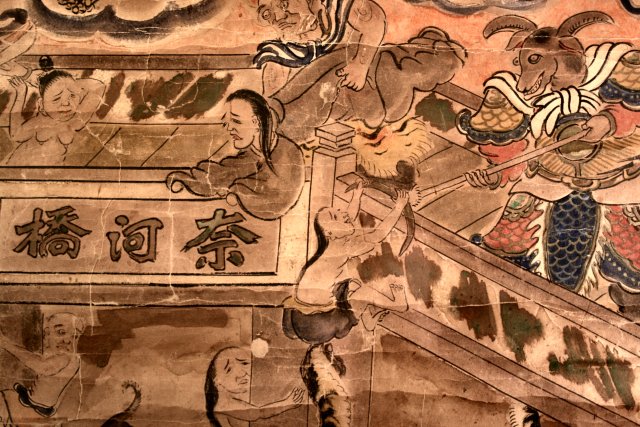
A second example of the "Bridge of no alternative" from another hell scroll (C3).
In H.Y.Lowe's account of early 20th century Beijing entitled The adventures of Wu, he writes: "The Sixtieth Day memorial service ended with the burning of a paper barge and a pair of paper bridges, allegedly for the purpose of aiding the spirit of old Mr. Wu to cross the Nai Ho River in the "lower region." It is a trying business to cross this fabulous river, if the legendary description of the river is to be credited, for it is said that the water is the domain of ferocious water demons as well as various poisonous creatures, such as venomous snakes and stinging scorpions, who are found in good numbers in the water. Those spirits who are not well-equipped for the journey fall victim to these tormentors."
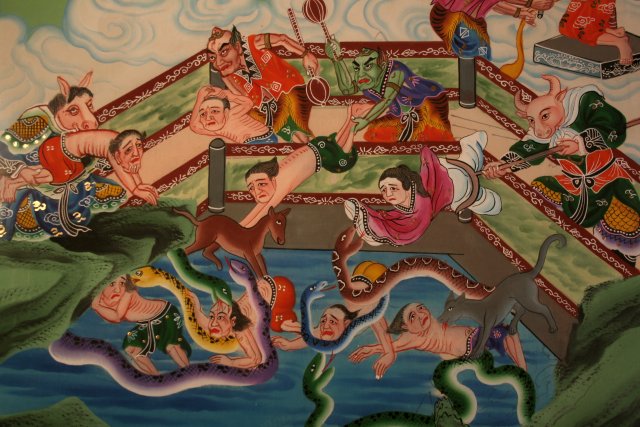
A third example of the "Bridge of no alternative" from another hell scroll (E5).
To continue with H.Y.Lowe's account: "It is also said that this Nai Ho River is formed by the streams of blood flowing from the various departments of hell and it is a nauseating experience to cross it as sinners are often pushed bodily into the "pool" of blood and their cries for help are loud and unending. To the spirits of those who have done good on earth, the heavenly gods provide a sort of escort, a convoy system, carrying paper banners to direct the spirits to the otherwise invisible sacred bridges or to aid them to board the divine ferry boat for a safe trip across. To be certain of proper accommodation the family of the dead person are in the habit of burning such articles of paper. This at least makes for the survivors' peace of mind."
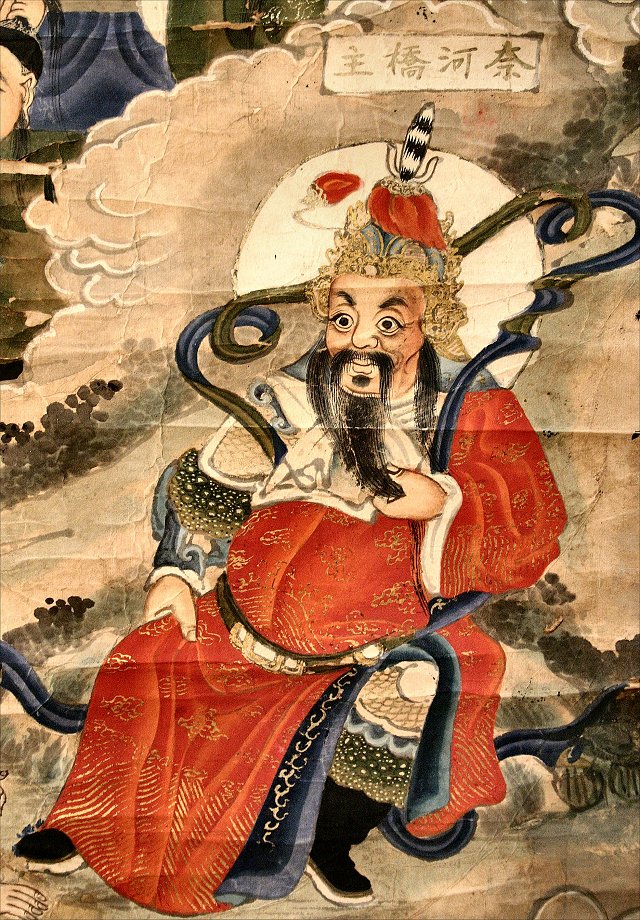
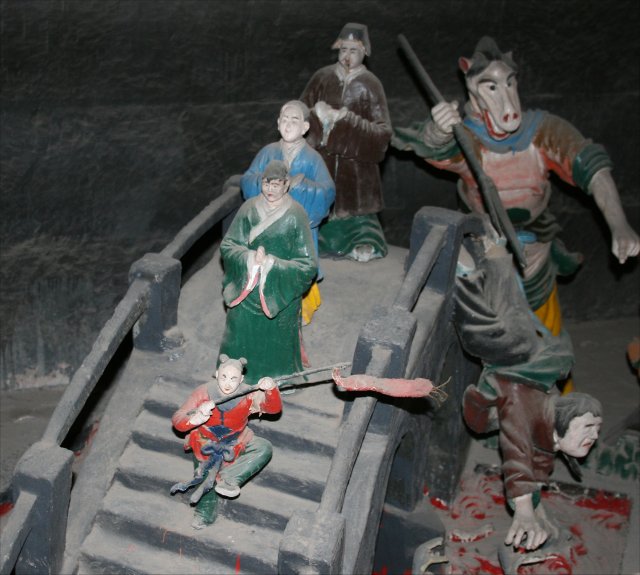
The "Bridge of no alternative" as depicted at Fengdu, the City of Ghosts.